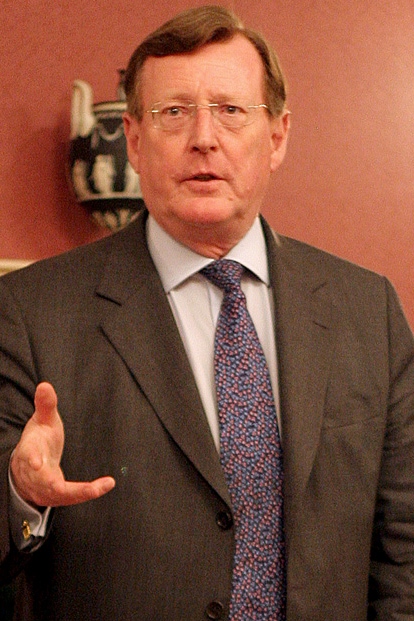David Trimble – 2001 Speech to Conservative Party Conference
The speech made by David Trimble, the then Leader of the Ulster Unionist Party, to Conservative Party Conference on 10 October 2001.
May I thank you for the invitation to speak here today. I have always wanted to see Ulster Unionism closer to the heart of British politics. Today will mark a further step in that direction. I am also glad to see this invitation has been noticed elsewhere. I happened to be in Downing Street last week and someone said to me, “I see you’re addressing the Tory Conference.” I said that it was nothing odd, after all he had a guest at his. Indeed I remarked that his guest Gerhard Schroeder said he had come to the Labour conference as part of his quest to unite Europe. My object today, however, is much more modest.
Obviously we meet at a very special time. May I say how proud I am at the contribution Britain is making at the moment. The attack on the World Trade Center was the greatest terrorist attack on the British people since the defeat of Hitler. It affected people from all parts of the British Isles – at least three of the dead came from Northern Ireland. We all know there may be greater challenges ahead for our armed forces and indeed for society here in Britain and our thoughts and prayers are with our servicemen and all those who protect us at home or abroad.
But the Government today is doing precisely what we would want and expect a British government to do and it will be supported.
In a situation like this we know the need to act and act decisively even though, inescapably, one must act on imperfect information producing results that may fall short of the ideal.
But if I can digress, Britain and America find it easier to act because they have governments capable of taking decisions. The hesitant and sometimes uncertain responses of our European partners are because in most cases they are governed by coalitions. Inevitably they are less capable of quick and resolute decision. And, of course, coalitions are the inevitable consequence of proportional representation. I have had experience of more than one form of proportional representation. But I must resist the temptation of telling you of the drawbacks of PR.
But if the response to Bin laden and the Taleban is clear-cut, unfortunately at home in Northern Ireland, the position is not so clear. The problem is uncertainty and the Government’s reluctance to grasp the nettle.
I still think John Major was right when he began the process. Whatever one might think of the character of those involved in terrorism, if they were saying that they were prepared to turn their back on terrorism and embrace peace and democracy, then, if only for the sake of the people who identified with them politically, it was right to explore the chance of peaceful evolution.
The problem is that the terrorists have tried to have it both ways – the ballot box and the armalite. They have delayed a clear and unequivocal commitment to peace.
We can all go back over the last few years and say we would have done this or that differently. But the point today is that I and my party are now bringing matters to a head in order to force Sinn Fein and the IRA to decide. We are not doing this cynically to exploit the mood after 11 September. We have been steadily, patiently, building the pressure since last October. On Monday we took the final steps, which will result, by about today week, in the resignation of the Unionist Ministers from the Northern Ireland Executive. This will be shortly followed by the removal therefrom of the Sinn Fein Ministers until they prove by decommissioning that they have left violence behind.
We have waited a long time – three and a half years since the Agreement – seventeen months since the IRA itself promised to put their weapons beyond use. If they are ever going to do it, it must be now. If they do, fine. Then the new institutions will bed down. If they do not it will be clear that we must change the institutions so they can survive Sinn Fein’s failure. There may be reluctance to make those changes, but the need will be inescapable.
Either way I look forward to greater certainty and stability in Northern Ireland. But Northern Ireland does not exist in isolation. It is part of the United Kingdom. There is a wider context, which we should consider.
So it is natural to consider our relationship with national politics. Because I am here, some have speculated that I am going to talk about future links between Conservatives and Ulster Unionists. And of course there was for a long time a structural relationship between our parties and there is a strong continuing friendship. But this is too big an issue to be approached simply in a sectional way. I would prefer to reflect first more broadly.
There is a communal aspect to party structures in Ulster. This has some unfortunate consequences. Some who do not want a united Ireland will vote nationalist out of a perceived need for communal solidarity. On the other hand some opt out of politics completely because they dislike the communal background of most parties. Most Ulster Unionists would think of themselves as small “c” conservatives. But some would identify more with labour and are Unionist for communal reasons.
Once it was different. In the nineteenth century, both the Liberal and Conservative parties organized throughout Ireland. In the early twentieth Labour too organized there. But in response to Irish nationalism those involved in those parties coalesced to form Ulster Unionism. It was understandable and for decades it gave us stability. But it has this disadvantage – politics in Northern Ireland are based on a nationalist framework of reference. Parties are based on the fundamental issue of whether they are for or against a united Ireland.
Compare Scotland. Parties there are based on a British framework of reference. The major British parties are there providing to the Scottish people the full range of British politics and then, alongside them there is a Scottish nationalist party. To a British person who wants to see and take part in British politics, the Scottish model is preferable to that we have in Northern Ireland.
To its credit the Conservative Party has recognized this. Moreover it is important that the decision in the late 80s to organize in Northern Ireland was taken in response to pressure from the grassroots of the party. They felt, rightly, that some of the party’s policies on Northern Ireland were wrong, and they wanted to send a message of sympathy to the British people of Ulster.
But a move by Conservatives alone could not break the mold. If things are to change, if we are to move from a Irish nationalist to a British pluralist basis of politics, then we need two things.
First all the national parties must move. I am sure that this party will do its bit. The problem is Labour. It too must be prepared to move. There is an element in Labour sympathetic to Irish nationalism who have resisted this. But they must realise that, with the acceptance by the Irish government and by all the Irish nationalist parties of the consent principle, their attitudes must change.
If Tony Blair was right when, on his first visit to Ulster as Prime Minister in May 1997, he said to some primary school children, that there would not be a United Ireland in their lifetime, then Labour has a duty to provide political opportunities for those children throughout their lives. And Labour members with Irish nationalist sympathies should remember the considerable contribution to the positive development of community relations in Scotland that resulted from Wheatley’s decision to take the Irish nationalist organization in Scotland into the Labour party there.
The second thing concerns the party politics in Northern Ireland. Clearly it will be radically affected. I know there will be many in all parties, my own included who will be cautious. And we will not want to give up our capacity to exercise our own judgment on local issues. Moreover it is not until there is a sense of stability, a sense that Ulster’s place within the Union is secure, that the Assembly and the new arrangements have bedded – not until all that is settled will folk focus fully on these wider issues.
But I am sure that they will want to address these wider issues. I am sure that the basic concepts of the Agreement are sound – the consent principle to settle the constitutional issue – a regional assembly to give democratic accountability on local issues – an Irish dimension to acknowledge the identity of nationalists.
But more is needed. The Assembly is limited. It has to operate within the context of the overall economic and social policy of the national government. If the Assembly is all there is the people will not fell that they are properly involved in politics. Taxation, expenditure, defence, foreign policy, are still determined in London. Unless there is a sense of involvement and accountability on those issues, the electorate in Northern Ireland will not be satisfied.
This problem does not exist with regard to Scotland and Wales. There the people can vote for the national parties who decide these matters. I do not think we will have a healthy political system until the people of Northern Ireland have a similar opportunity to “turn the rascals out”. And it is in the interests of the people of Great Britain, and in the interests of the people of the Republic of Ireland to encourage the development of healthier politics in Northern Ireland.
There is another aspect too. The present structures prevent a person in Northern Ireland participating in British national politics. The last two governments contained Ministers from Northern Ireland. But Sir Brian Mawhinney and Kate Hoey had to leave Northern Ireland in order to be able to participate.
It reminds me of the comparison between Belfast and Bangkok. The question is what can you do in Bangkok that you cannot do in Belfast? The answer of course is join the Labour party. Northern Ireland is the only place on the globe where you cannot join Labour. It is a civil rights issue.
This is not something that is going to change overnight. It is not on the agenda today. But it is something we should think about. It will probably be on tomorrow’s agenda. It is right that it should for in a sense it is just filling in the British dimension to the Agreement. When the time comes I believe this party will be ready. I hope mine will be. Together I think we can meet the need. The real challenge, however, is for New Labour and Tony Blair.
Mr. Blair made a good beginning on Northern Ireland. That May 1997 speech was sound on the basic principles. Without him there would not have been an Agreement in April 1998.
But then came the implementation. Understandably he left much of that to others. To an extent he took his eye off the ball. Expediency slithered into appeasement. Confidence in the Agreement ebbed as people felt that the concessions were all one way.
But there is the chance now to recover – indeed to fulfill the original promise. The paramilitaries can be faced down – the Assembly stabilized.
And by moving forward with this party he could offer a range of political alternatives to the people of Ulster.
It is often said that we are the prisoners of history.
But the key on outside.
Mr. Blair it is time to turn it.
Time to treat the people of Northern Ireland as fully part of the United Kingdom.


